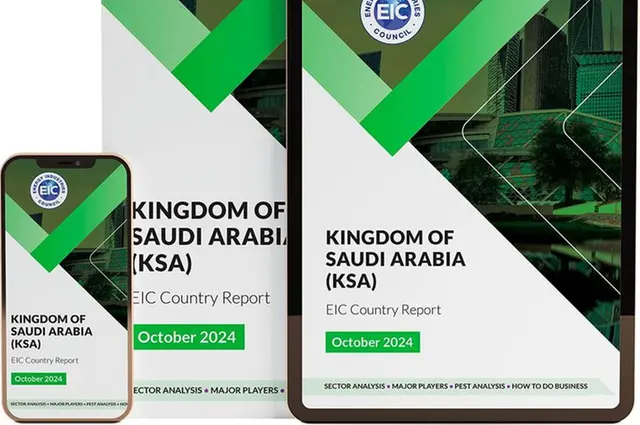While maintaining its leading global position as a producer of hydrocarbons, Saudi Arabia is embarking on a major transformation of its energy sector, rolling out cleantech projects—ranging from hydrogen and carbon capture to solar and wind power—as part of its long-term plans to achieve a zero-carbon economy, a new report by the Energy Industries Council (EIC) reveals.
The Kingdom of Saudi Arabia Country Report 2024 paints a detailed picture of the Saudi energy landscape, underpinned by mega projects from oil and gas to hydrogen. The Saudi economy, the report shows, is still largely dependent on oil and gas, which makes up 55% of country’s economy. Power generation is also powered for the bulk of by oil, 54%, and gas 46%.
But Saudi Arabia wants under its Vision 2030 national strategy to diversify its economy and reduce dependence on fossil fuels. Despite sitting on 267.2 billion barrels of oil reserves and producing 11.389 million barrels per day, according to 2023 figures, the kingdom is making some major cleantech investments.
According to the EIC report, the kingdom has seen a surge in renewable energy projects, particularly in solar and wind power. The National Renewable Energy Programme’s latest rounds are focusing on solar photovoltaic and wind energy, which aim for a combined capacity of 4.5 gigawatts (GW).
Under current plants, Saudi Arabia will install 120 GW of power generation capacity by 2030, with the aim of having 50% of this capacity come from renewable sources. As of 2023, the country’s renewable energy capacity stood at 3.67 GW.
The report also includes details on Saudi Arabia’s grand plans for hydrogen production and carbon capture and storage (CCS) installations. The Kingdom’s goal is to produce 4 million tonnes per annum of clean hydrogen by 2035 and expects to invest as much as $16.1 billion to achieve that capacity. Major projects such as the NEOM Green Hydrogen Facility, set to produce 650 tonnes of green hydrogen per day by 2026, are central to this goal.
In CCS, Saudi Aramco targets capturing 14 million tonnes of carbon annually by 2035. The upcoming Jubail Industrial City CCS hub, expected to be operational by 2027, is a significant part of these efforts. The country also pledged not to build new power stations running on fossil fuels unless they are fitted with CCS technology.
To see the full report, please visit: https://www.the-eic.com/MediaCentre/Publications/Reports
About Energy Industries Council
The Energy Industries Council brings together over 950 companies from the energy supply chain sector across all industries.
Since 1943, we have evolved to provide up-to-date global market intelligence, unrivalled networking opportunities, and direct engagement with policymakers across regions.
Our members—leading innovators, industry experts, and global thinkers—are at the forefront of the energy transition, delivering on Net Zero.
Through our leading events, real-time project data, and policy expertise, we help members capitalise on opportunities and scale their operations globally. Together, we are working towards a more sustainable future.

